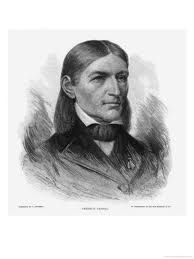
In all things there lives and reigns an eternal law. To him whose mind, through disposition and faith, is filled, penetrated, and quickened with the necessity that this cannot possibly be otherwise, as well as to him whose clear, calm mental vision beholds the inner in the outer and through the outer, and sees the outer proceeding with logical necessity from the essence of the inner, this law has been and is enounced with equal clearness and distinctness in nature (the external), in the spirit (the internal), and in life which unites the two. This all-controlling law is necessarily based on an all pervading, energetic, living, self-conscious, and hence eternal Unity. This fact, as well as the Unity itself, is again vividly recognized, either through faith or through insight, with equal clearness and comprehensiveness; therefore, a quietly observant human mind, a thoughtful, clear human intellect, has never failed, and will never fail, to recognize this Unity.
This Unity is God. All things have come from the Divine Unity, from God, and have their origin in the Divine Unity, in God alone. God is the sole course of all things. In all things there lives and reigns the Divine Unity, God. All things are only through the divine effluence that lives in them. The divine effluence that lives in each thing is the essence of each thing.
It is the destiny and lifework of all things to unfold their essence, hence their divine being, and therefore, the Divine Unity itself to reveal God in their external and transient being. It is the special destiny and life-work of man, as an intelligent and rational being, to become fully, vividly, and clearly conscious of his essence, of the divine effluence in him, and, therefore, of God; to become full, vividly and clearly conscious of his destiny and life-work, and to accomplish this, to render it (his essence) active, to reveal it in his own life with self-determination and freedom.
Education consists in leading man, as a thinking, intelligent being, growing into self-consciousness, to a pure and unsullied, conscious and free representation of the inner law of Divine Unity, and in teaching him ways and means thereto.
The knowledge of that eternal law, the insight into its origin, into its essence, into the totality, the connection, and intensity of its effects, the knowledge of life in its totality constitute science, the science of life; and, referred by the self-conscious, thinking, intelligent being to representation and practice through and in himself, this becomes science of education.
By education, then, the divine essence of man should be unfolded, brought out, lifted into consciousness, and man himself raised into free, conscious obedience to the divine principle that lives in him, and to a free representation of this principle in his life.
Education, in instruction, should lead man to see and know the divine, spiritual, and eternal principle, which animates surrounding nature, constitutes the essence of nature, and is permanently manifested in nature; and, in living reciprocity and united with training, it should express and demonstrate the fact that the same law rules both (the divine principle and nature), as it does nature and man.
Education as a whole, by means of instruction and training, should bring to man’s consciousness, and render efficient in his life, the fact that man and nature proceed from God and are conditioned by him – that both have their being in God.
Education should lead and guide man to clearness concerning himself and in himself, to peace with nature, and to unity with God; hence, it should lift him to a knowledge of himself and of mankind, to a knowledge of God and of nature, and to the pure and holy life to which such knowledge leads.
Man, humanity in man, as an external manifestation, should therefore, be looked upon not as perfectly developed, not as fixed and stationary, but as steadily and progressively growing, in a state of ever-living development, ever ascending from one stage of culture to another towards its aim which partakes of the infinite and eternal.
It is unspeakably pernicious to look upon the development of humanity as stationary and completed, and to see in its present phases simply repetitions and greater generalizations of itself. For the child, as well as every successive generation, becomes thereby exclusively imitative, an external dead copy as it were, a cast of the proceeding.
Indeed, each successive generation and each successive individual human being, in as much as he would understand the past and present, must pass through all preceding phases of human development and culture, and this should not be done in the way of dead imitation or mere copying, but in the way of living, spontaneous self-activity.
Friedrich Wilhelm Froebel
(The author Friedrich Wilhelm Froebel (1782-1852), was well-known in the field of education as the founder of the kindergarten. What is not as known is that his educational philosophy proceeds from a profound spiritual conception of life, somewhat similar to the one held by eastern sages.)





